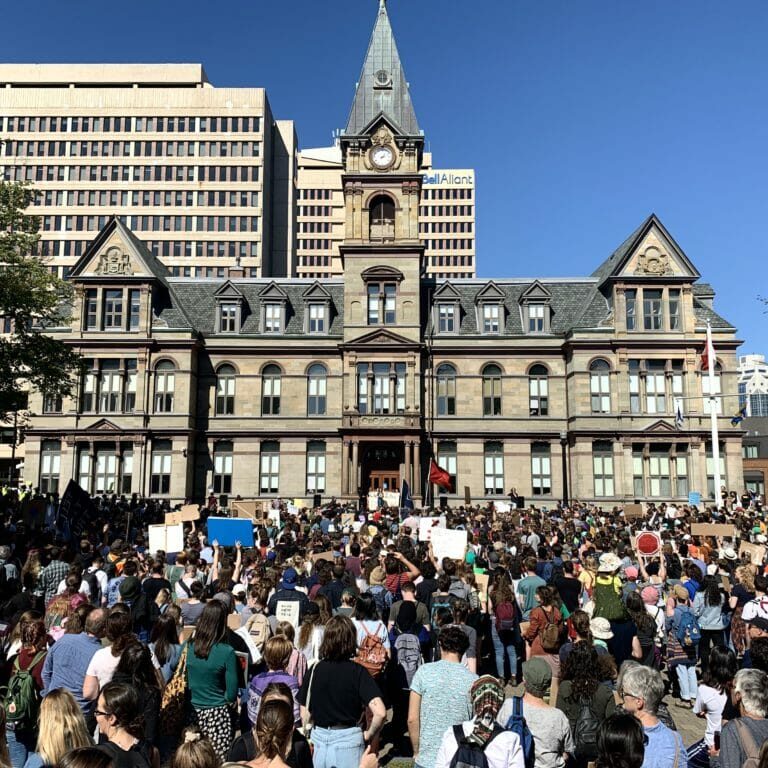
Students are the environmental voting bloc
Strong and immediate climate action a priority for youth
The Oct. 21 election comes just one month after the K’jipuktuk-Halifax Week of Climate Action. In a series of interviews in The Guardian, youth voters in Atlantic Canada have identified climate action as one of their top priorities as they head to the polls this month.
Youth voter turnout (ages 18-24), according to Elections Canada, has consistently been among the lowest of the age groups since 2004. This year, it is the largest voting bloc.
“This is the kind of election where it’s particularly important that young people come out and vote and express their views,” says Anders Hayden, a political science professor at Dalhousie University.
While environmental issues have been at the forefront of elections in the past, the tone has shifted this time around, Hayden says, with more emphasis placed on the importance of strong and immediate climate action.
This added sense of urgency comes, in part, due to the series of climate reports released by the Intergovernmental Panel on Climate Change (IPCC) over the last two years. The 2018 report states that in order to prevent global temperature rise from exceeding 1.5 degrees Celsius, CO2 emissions will need to be reduced by 45 per cent by 2030.
Environmentalist David Suzuki, in an interview in Halifax, said “we have to make some big decisions and we’ve been given a very narrow window by the IPCC.”
“I believe that this is the most important election, certainly in my lifetime.” He has lived through 23.
Andrew Bergel, a professor in Dalhousie’s College of Sustainability, says there are many reasons why some students may not vote. Some feel uninformed and worried about making the wrong choice, for instance. “I find sometimes when I talk to younger voters that they almost feel like they don’t know enough to vote.”
Halifax and its universities have been tackling this problem by hosting debates with local candidates.
Halifax candidates’ climate plans
On Oct. 3, 2019, Halifax member of parliament candidates were invited to participate in an environmental debate at the Ummah Masjid and Community Center. The debate was hosted by the Ecology Action Centre as part of the 100 debates initiative. It acted as an opportunity for the MP candidates in attendance to talk about how they would implement federal environmental platforms if they end up being elected.
Christine Saulnier, Andy Fillmore, and Jo-Ann Roberts, MP candidates for the New Democratic Party, Liberal Party and Green Party respectively, were in attendance. Bruce Holland, the Halifax MP candidate for the Conservative Party of Canada, was not in attendance.
The debate covered topics such as water and air pollution, the implementation of the United Nations Declaration on the Rights of Indigenous Peoples, the importance of meeting the targets set out in the Paris Agreement and adaptation and mitigation strategies surrounding the impacts of climate change.
At the debate, Christine Saulnier (NDP) talked about plans, at the federal level, to increase accountability around climate action and to transition towards an energy industry based more on renewable sources. She also touched on the NDP’s commitment to protect, with law, the right to a healthy environment.
Andy Fillmore, Liberal Party candidate and current Halifax MP, outlined past accomplishments that the Liberal Party has seen, including reducing the margin by which Canada had been on track to surpass the carbon emission targets set outlined by the IPCC. He also expressed the Liberal Party’s commitment to respecting legislation such as UNDRIP and the Truth and Reconciliation Commission’s Calls to Action.
Jo-Ann Roberts, candidate for the Green Party, commended the recent student mobilization for climate action and outlined her party’s plan to meet the demands the students have made. She also touched on the Green Party’s plan to create a climate cabinet that would lessen the partisan divides on climate action that currently exist.
An ongoing battle
Climate action has been at its peak in the last few months, but it doesn’t end there.
While voter turnout and voting for climate action are important heading into the election, Andrew Bergel added a reminder that no matter the outcome, the mobilization of voters seeking strong climate action should continue beyond the election.
“None of the parties you’re going to vote for are going to give you all the things you want environmentally,” he says. “You have to hold them accountable in the sense that this needs to be something that’s ongoing, not just during an election, but also during the governance part.”
Disclosure: On Oct. 22, 2019, this article was edited to add further context to Andrew Bergel's initial quote.






